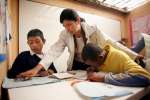- Text size
 |
|  |
|  |
| 
- عربي
Making a difference in refugees' lives through education
News Stories, 5 October 2015
ISLAMABAD, Sept 30, Pakistan (UNHCR) – Life tests student Abdul Khalil, a 30-year-old refugee from Afghanistan, to the limits. Each day, he works between 18 to 19 hours.
He starts at 8:00 a.m. from the university where he studies and finishes at a flooring sheet factory at 3:00 a.m. where he works.
Khalil's family fled their native Kunduz in Afghanistan in 1986 when he was aged one and took refuge in Pakistan's Balochistan province. The family later shifted to the provincial capital Quetta after spending three years in a refugee camp.
In Quetta Khalil was enrolled in a private school, but due to his father's meagre income he was soon moved to a public school.
His ailing 74-year-old father cannot support a seven-member family alone. He does still work as a labourer at a local market in Quetta, but it is day-to-work and uncertain.
Khalil, the only literate member of his family, also has to work because he wanted to continue he studies for which he needed extra resources.
Thanks to an UNHCR-supported DAFI scholarship, Khalil was able to enroll in a Bachelor of Science in Computer Science (BSCS) at a local university in 2012.
He will complete his graduation in October this year and wants to get admission for a Masters course.
"I was so depressed when I finished high school because I could not see any means to continue my studies and get admission at university until a friend of mine told me about UNHCR's DAFI scholarship," he said.
DAFI, the Albert Einstein German Academic Refugee Initiative is a scholarship assistance program for refugees funded by the German Government and implemented worldwide by the UN refugee agency. The scholarships, for study at the tertiary level in universities and polytechnic institutions, offer a lifeline to many poor refugees.
The purpose of the DAFI programme is to assist self-reliance among refugees like Khalil by providing them with professional qualification for future employment.
In Pakistan, since 1992 until today, DAFI scholarships have supported approximately 1,200 Afghan students. They facilitate students to go beyond basic education by opening up access to secondary schooling and college/university-level education.
Indrika Ratwatte, UNHCR Representative in Pakistan said: "Investing in a refugee youth's education is an investment in their future and in generations to come. Education gives young lives meaning and hope for the future. Educated refugees can provide leadership and the vital skills need to rebuild lives and communities."
Khalil wishes to dedicate his life to education. "I want every Afghan child enrolled in school because that is the only way through which we could bring prosperity in our war-torn country Afghanistan."
He also teaches at a local school setup for Afghan refugee children in the afternoon and then at night until early morning he works at a factory. His two jobs earn him Rs. 19,000 (US $182) a month which hardly covers the daily expenditure of his family.
"I would never want any child go through the hardship of life the way I have been experiencing it. Poverty should not be an excuse to deprive children from getting an education. But poor Afghan families are left with no choice but to send their children to work rather than study to support families financially." Khalil added.
Afghanistan's refugee population constitutes the largest protracted situation in the world. Pakistan has hosted Afghan refugees for over 35 years now. The registered 1.5 million Afghan refugees in the country represents 14 per cent of the total refugee population worldwide and is one of UNHCR's largest and longest lasting refugee operations.
One in five refugees worldwide is from Afghanistan and more than 50 per cent of Afghan refugees are children.
In future, Khalil wishes to setup a school for orphaned Afghan refugee children in Quetta who are forced to work as child labourers because there is no one to look after their families.
Ratwatte underlines the important role of education in the rebuilding of post conflict countries and notes that " Empowering Afghan Youth through education and skill development is building the human capital of the future Afghanistan. Helping Afghans return home and empowering them to rebuild their lives and communities is key to stability in Afghanistan and the entire region."
Khalil says he is happy to see the National Unity Government in Afghanistan working hard to alleviate the sufferings of ordinary Afghans. However, he thinks there is still a long way to go to put Afghanistan on a par with other developing countries.
"Afghanistan is currently battling with unemployment, warlords, corruption and ethnic divisions," he said and added: "We can get rid of these evils only through quality education, equally accessible to all Afghans so the international community should invest more in education; setup more schools, colleges and universities to make Afghanistan stand back on its feet."
By Duniya Aslam Khan, Islamabad, Pakistan













































